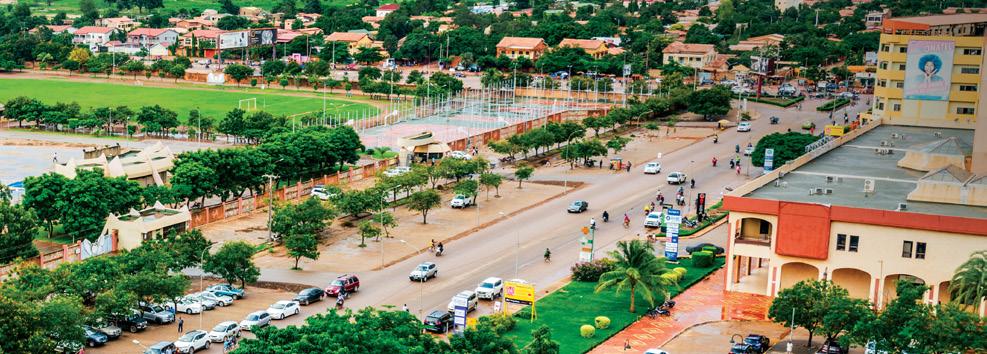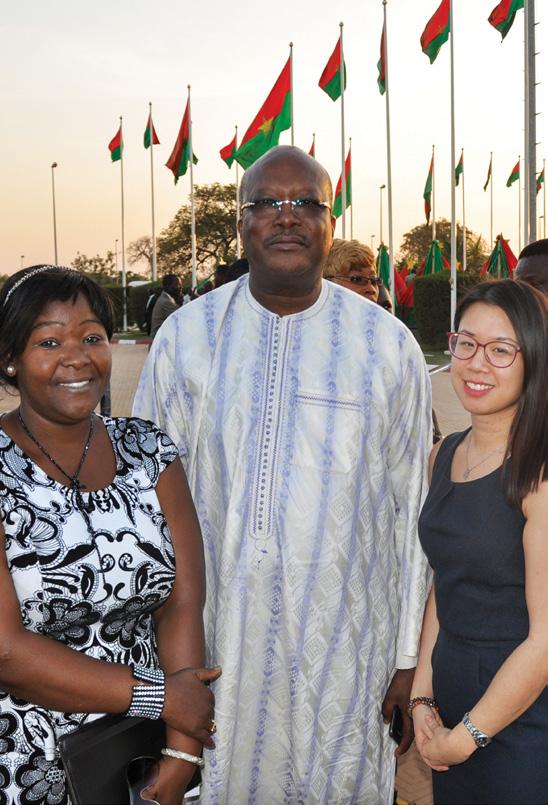
4 minute read
EMPOWERING FUTURE AFRICAN POLITICAL LEADERS
Julie Tran ’09 | BURKINA FASO
In her day job, Julie Tran ’09 is a local councilor for the Swedish Centre Party. But her career took on an international bent when she was invited to work for a program training the next generation of political leaders in French-speaking West Africa.
There are many ways to change the world. In high school, what I wanted to do more than anything was to change the world by working for the UN. Looking back, I could have ended up with any organization that took for its mission improving people’s living standards, working toward peace and creating a better world. What was important to me was finding a platform that enabled me to make a difference. I could have joined an NGO, worked as a civil servant in a municipality or acted as a lobbyist for an environmental organization; in fact, I went into politics.
This year marks my tenth anniversary in politics since graduating from AUP. Today, I am an elected regional councilor in Sweden – though that hasn’t stopped my work taking on an international element. Out of all my political achievements so far, the one that has had the greatest impact on my life is the Program for Young Politicians in Africa (PYPA). It consists of a multiparty political academy that aims to build the capacity of young political leaders, strengthening their participation and influence in politics, so that they too can change the world.

Julie Tran with PYPA participants and Chérif Sy (in white), President of the national transitional council of Burkina Faso
It is PYPA’s international aspects that most inspire me. Since it started in 2012, it has come to be active in 16 countries across Africa. It is a groundbreaking program that responds to the real needs of young people, and in particular young women, who have limited opportunities to influence social development across the continent, largely due to age and gender discrimination and the distribution of power within political parties and across society.
I started working with PYPA during my two years on the board of the Swedish Centre Party’s International Foundation (CIS); it was at this time that I felt my passion for international politics come alive. CIS works in regions where democracy needs to be supported. Together with local partners, they implement programs to empower women and youth to be key agents of change in order to improve national conditions for peace and prosperity. Their work is built on a human rights–based approach, which seeks to ensure transparency, accountability, participation and nondiscrimination at all levels. This approach is particularly evident in PYPA, as the program engages in multiparty capacity building for young political leaders. CIS and their local partners implement PYPA in seven countries in French-speaking West Africa, in close collaboration with political parties and organizations.
My first contact with PYPA was through the CIS program manager, Malena Liedholm Ndounou. She had heard about a young politician in the Centre Party who spoke French; being a French speaker was apparently rare in my party. I was soon invited to speak on the youth perspective in Swedish politics at a PYPA training session in Ouagadougou, Burkina Faso. PYPA works with the youth perspective in several ways: it includes it as a specific training topic; it encourages participants to promote youth rights in mini-projects and alumni activities; and it strives to communicate to participating youth that they are the bearers of both rights and duties.

View of Ouagadougou, Burkina Faso
During 2014, I returned to Burkina Faso twice, once with PYPA and once by my own initiative as a board member for CIS. There had been unrest in the country because the President at the time, Blaise Campaoré, wanted to prolong his mandate in power. He ended up fleeing the country. I had come to Ouagadougou a second time because I wanted to meet with PYPA participants and hear their stories about this historic event. While in Ouagadougou, I witnessed increased political participation from PYPA alumni: Celine Ouedraogo, from the PYPA class of 2014, facilitated a meeting with the country’s current president, Roch Marc Christian Kaborés, for whom she works. She confirmed that PYPA helped increase her political and analytical capacity. She is determined to bring change to her country by focusing on the political education of women and young people.
In 2015, PYPA led me to Cotonou in Benin, where I held a workshop on dealing with master suppression techniques (also called domination techniques) – a Norwegian framework for understanding strategies for social manipulation and coercion – for young female Beninese politicians. The aim was to equip participants with skills to help them tackle discriminatory practices that were preventing them from accessing political spaces. I held another workshop, about political campaigns, for former PYPA participants. Sainthia Lassissi, a young Beninese woman from the PYPA class of 2014, told me afterward that PYPA had allowed her to regain confidence in herself, permitted her to evolve politically and taught her to speak in public – she has since accepted a position as assistant to Sacca Lafia, the president of the Union for Democracy and National Solidarity.
Working with PYPA has been an effective way for me to contribute to more democratic, representative and nondiscriminatory political systems across West Africa. PYPA creates networks between young politicians both among African nations and within them; this is crucial since it binds members of opposing parties together in the fight for a common goal – that of a better future for the continent. In the spirit of AUP, the project showcases the benefits of countries exchanging knowledge and experiences and transcending cultural differences and national boundaries. If that’s not a great way to change the world, I don’t know what is.

Julie Tran at a New Year’s celebration ALUMNI with PYPA EDITION alumni 62Celine (left)and President Roch Marc Christian Kaboré of Burkina Faso (center)










